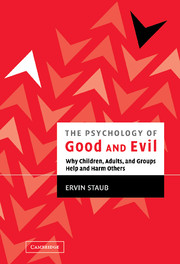Book contents
- Frontmatter
- Contents
- Preface
- Acknowledgments
- PART I INTRODUCTION AND CORE CONCEPTS
- PART II THE ROOTS OF HELPING OTHER PEOPLE IN NEED IN CONTRAST TO PASSIVITY
- PART III HOW CHILDREN BECOME CARING AND HELPFUL RATHER THAN HOSTILE AND AGGRESSIVE
- 10 The Origins of Caring, Helping, and Nonaggression: Parental Socialization, the Family System, and Cultural Influence
- 11 Natural Socialization: The Role of Experience or Learning by Doing
- 12 The Origins of Hostility and Aggression
- 13 Cultural–Societal Roots of Violence: Youth Violence
- 14 Bystanders and Bullying
- 15 Students' Experience of Bullying and Other Aspects of Their Lives in Middle School in Belchertown: Report Summary
- 16 Passive and Active Bystandership across Grades in Response to Students Bullying Other Students
- 17 Self-Esteem and Aggression
- 18 Father–Daughter Incest
- 19 Reducing Boys' Aggression: Learning to Fulfill Basic Needs Constructively
- 20 Creating Caring Schools: Design and Content of a Program to Develop Caring, Helping, Positive Self-Esteem, and Nonviolence
- PART IV THE ORIGINS OF GENOCIDE, MASS KILLING, AND OTHER COLLECTIVE VIOLENCE
- PART V THE AFTERMATH OF MASS VIOLENCE: TRAUMA, HEALING, PREVENTION, AND RECONCILIATION
- PART VI CREATING CARING, MORALLY INCLUSIVE, PEACEFUL SOCIETIES
- Appendix: What Are Your Values and Goals?
- Index
- References
11 - Natural Socialization: The Role of Experience or Learning by Doing
Published online by Cambridge University Press: 07 May 2010
- Frontmatter
- Contents
- Preface
- Acknowledgments
- PART I INTRODUCTION AND CORE CONCEPTS
- PART II THE ROOTS OF HELPING OTHER PEOPLE IN NEED IN CONTRAST TO PASSIVITY
- PART III HOW CHILDREN BECOME CARING AND HELPFUL RATHER THAN HOSTILE AND AGGRESSIVE
- 10 The Origins of Caring, Helping, and Nonaggression: Parental Socialization, the Family System, and Cultural Influence
- 11 Natural Socialization: The Role of Experience or Learning by Doing
- 12 The Origins of Hostility and Aggression
- 13 Cultural–Societal Roots of Violence: Youth Violence
- 14 Bystanders and Bullying
- 15 Students' Experience of Bullying and Other Aspects of Their Lives in Middle School in Belchertown: Report Summary
- 16 Passive and Active Bystandership across Grades in Response to Students Bullying Other Students
- 17 Self-Esteem and Aggression
- 18 Father–Daughter Incest
- 19 Reducing Boys' Aggression: Learning to Fulfill Basic Needs Constructively
- 20 Creating Caring Schools: Design and Content of a Program to Develop Caring, Helping, Positive Self-Esteem, and Nonviolence
- PART IV THE ORIGINS OF GENOCIDE, MASS KILLING, AND OTHER COLLECTIVE VIOLENCE
- PART V THE AFTERMATH OF MASS VIOLENCE: TRAUMA, HEALING, PREVENTION, AND RECONCILIATION
- PART VI CREATING CARING, MORALLY INCLUSIVE, PEACEFUL SOCIETIES
- Appendix: What Are Your Values and Goals?
- Index
- References
Summary
focusing responsibility on children and learning by participation
Enacting or rehearsing prosocial behavior is important if children are to learn to behave prosocially. Certain types of influences on children, such as verbal communications, will acquire meaning and gain acceptance when they are experienced in conjunction with ongoing prosocial action.
I have previously suggested (Staub, 1975a, 1975b, 1978c; Staub & Feinberg, 1978) that an important influence on children learning to behave prosocially is the focusing of responsibility on them by parents and other socializing agents to engage in behavior that enhances others' welfare. Focusing responsibility refers to the demand by the parent that the child engage in prosocial behavior. It does not refer to a method of discipline, such as love withdrawal or power assertion, which does not specify what values and behavior the parents wish to promote. Like induction, focusing responsibility on children to behave prosocially refers to a particular content area, to a particular type of behavior the parents wish to promote. Although responsibility assignment is likely to lead to knowledge of desirable behavior, knowledge of “family norms” or social norms, it can only be expected to lead to internalization and self-guidance if socializers employ effective controls so that the child will actually behave prosocially. Thus, effective focusing of responsibility on children might result from a combination of parental values and parental actions that induce behavior consistent with these values in the child.
- Type
- Chapter
- Information
- The Psychology of Good and EvilWhy Children, Adults, and Groups Help and Harm Others, pp. 173 - 198Publisher: Cambridge University PressPrint publication year: 2003



